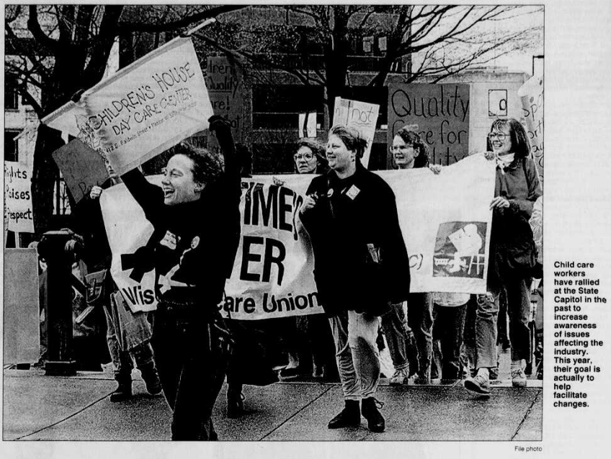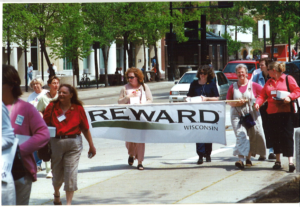by Paula Drew, WEESSN Co-Director; Peggy Haack, ECE Activist; Amy Schuster, REWARD, Program Director
While Worthy Wage Day always invokes a myriad of feelings, 2020 was likely one of our darkest tributes to this cause. With COVID-19 spreading across the state and the world, early care and education programs were asked to do the impossible – stay open to care for children of essential workers without necessary personal protective equipment to stay safe. It seems in some ways like that day has been repeated 365 times to bring us now to 2021, worn and weary. The pandemic has laid bare the significant challenges early childhood professionals face each and every day.
The 2020 Early Childhood Workforce Index indicates that wages have risen only 2% in Wisconsin for early educators since 2017. This is less than the rate of inflation. The poverty rate in Wisconsin for those working in early care and education (ECE) is a whopping 19.7%, nearly double that of all workers in the state (9.5%). Caring for and educating children is more difficult than it’s ever been and many are leaving the field for safer, and better-paying jobs elsewhere. Change has been needed some would argue for over a century. But today, it seems like change is the only way forward.
Even with the overwhelming complexity, ECE professionals are facing right now, they have taken to advocacy like never before. Demanding worthy wages, benefits, and safe working environments, Wisconsin ECE advocates have been quoted even internationally on child care issues. Because of this massive advocacy effort, and the fact that so many Americans depend on stable early care and education, this sector became a priority in federal relief efforts. Furthermore, this week President Biden unveiled The American Families Plan calling for “job-embedded coaching, professional development, and wages that reflect the importance of [our] work” and an unprecedented $425 billion to get the job done. It seems we could soon be at the precipice of a new way forward, with the government investing in ECE as the public good we all know that it is.
To take stock in how far we’ve come since the first Worthy Wage Day celebration in Wisconsin, we sought out insights from some veteran WECA advocates, Peggy Haack and Amy Schuster. Below is a shared reflection of the past and present Worthy Wage Day celebrations.
Reflection on the first Worthy Wage Day in Wisconsin
 Peggy: I recently viewed a video clip of the very first Worthy Wage Day in spring of 1992, where there I am, a family child care provider, on the steps of the WI State Capitol, speaking out to hundreds who have gathered there. To put it in historical context, on my back is my beautiful then 20-month-old daughter; she is now 30 years old and has a 20-month old child of her own – my grandson! I said then that our “great silence” was as harmful to us as our worthless wages. That day was, in fact, the beginning of a multi-year campaign to break our silence wide open, to make the world see us and hear us. The day was also the culmination of a decade and a half of organizing and agitating for better pay and working conditions in an era when such activity was labeled “unprofessional” by our own profession and children’s advocates of the time.
Peggy: I recently viewed a video clip of the very first Worthy Wage Day in spring of 1992, where there I am, a family child care provider, on the steps of the WI State Capitol, speaking out to hundreds who have gathered there. To put it in historical context, on my back is my beautiful then 20-month-old daughter; she is now 30 years old and has a 20-month old child of her own – my grandson! I said then that our “great silence” was as harmful to us as our worthless wages. That day was, in fact, the beginning of a multi-year campaign to break our silence wide open, to make the world see us and hear us. The day was also the culmination of a decade and a half of organizing and agitating for better pay and working conditions in an era when such activity was labeled “unprofessional” by our own profession and children’s advocates of the time.
What was so remarkably unique about that period of our history is that we had created a movement led by early educators themselves. Child care teachers and family child care providers gathered together. We planned the rallies, designed the flyers, wrote the newsletters. We were the orators. When we lacked skills, we sought out knowledge and we mentored each other in new learning. We discovered the power in the sharing of our stories – first with each other and then with those who needed to hear them. We were defining what a high-quality work environment was and what economic justice looked like. In the “doing”, we transformed ourselves…and we can do it again.
Amy: I joined the early childhood workforce right as the Worthy Wage campaign was taking hold, in the early 90s when I worked at a unionized child care center in Madison. I immediately connected with the union and the need to have frank discussions about the wages and benefits we deserved. The Worthy Wage campaign was the next step for me because it involved advocating outside my workplace, and for the larger ECE workforce. I have fond memories of rallies at the capitol, spreading the need for change. The Worthy Wage movement was key to my career trajectory because, within two years of this picture in the Wisconsin State Journal, I was working at WECA with my colleagues to develop and launch the REWARD Stipend Program. I thought “this is going to change everything!” Well, that was 20 years ago, and we are still talking about compensation. 
What I’ve learned is that the solution has to be two-pronged: immediate relief and long-term systematic change. The immediate relief is REWARD. REWARD is actively addressing the gap between actual wages and worthy wages by awarding bonuses now to child care providers. But the long-term systematic change involves altering the method and amount of funding that comes into the early education system so that wages can rise to appropriate levels without parents having to bear the burden of increased tuition. Simply put, more public investment is necessary. And I feel positive about this change because I strongly believe that one thing that has become clear to so many during COVID-19 is that early childhood education is essential, it is infrastructure, and it can no longer be ignored.
 Peggy: Worthy Wage Day 2021 is a day to embrace a history rooted in teacher activism. We have shoulders to stand on, lessons to learn, new tools for gathering, and new allies to collaborate with to move this struggle forward. Let’s do it!
Peggy: Worthy Wage Day 2021 is a day to embrace a history rooted in teacher activism. We have shoulders to stand on, lessons to learn, new tools for gathering, and new allies to collaborate with to move this struggle forward. Let’s do it!
Advocates like Peggy, Amy, and many of you reading this article have fought long and hard for worthy wages, benefits, safe and supportive work environments, and the dignity you deserve as early childhood professionals. While we know there is much more work to be done as America considers investing substantially in children, families, and our workforce – today, we’re feeling hopeful. To all of our sisters (and brothers) currently working in the field and those of generations past who laid the groundwork for the current conversation, you are worthy. We see you. We hear you. And, we will continue to fight alongside you.
The fight for Worthy Wages continues! Look for a WECA Advocacy Alert next week encouraging you to engage with Wisconsin lawmakers and ask for increased funding in the next state budget for Early Childhood Education including the REWARD Stipend Program.
